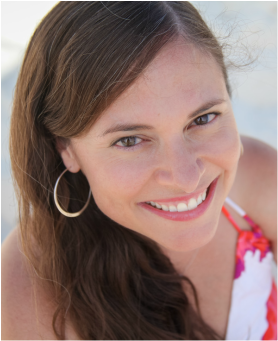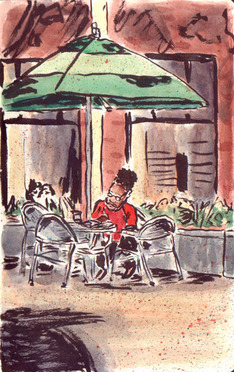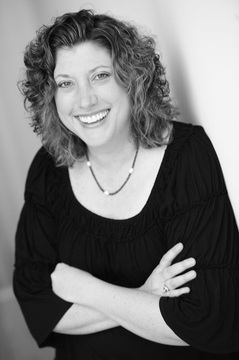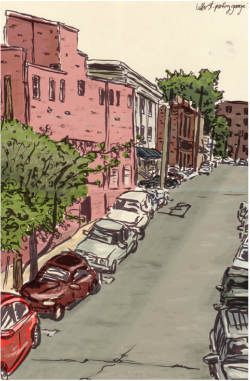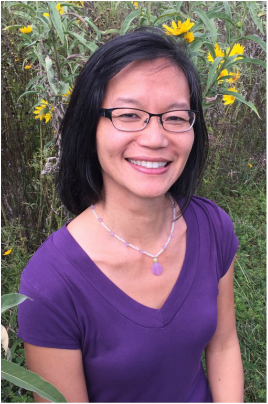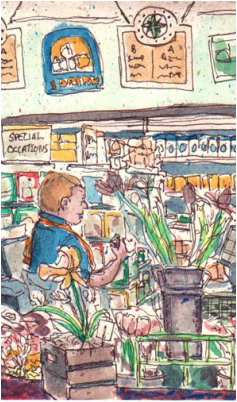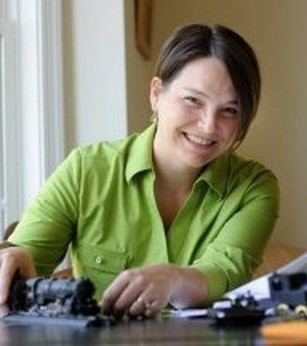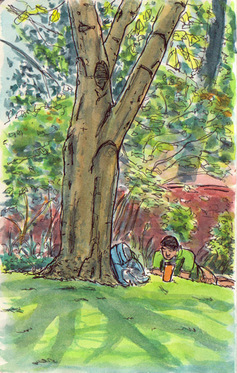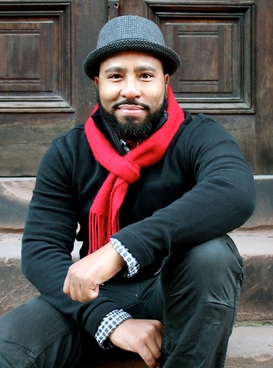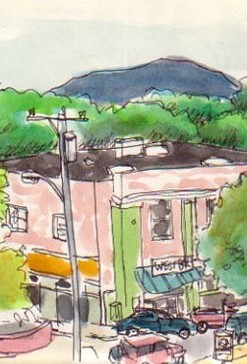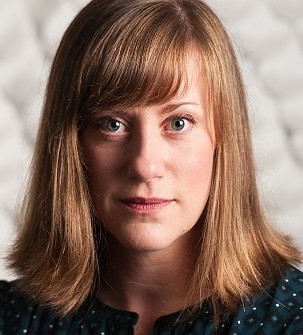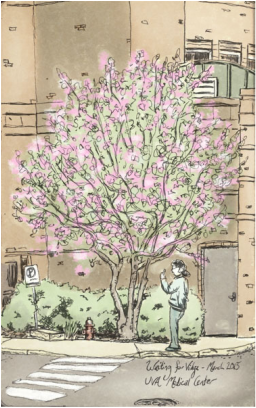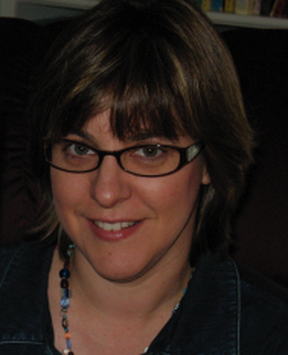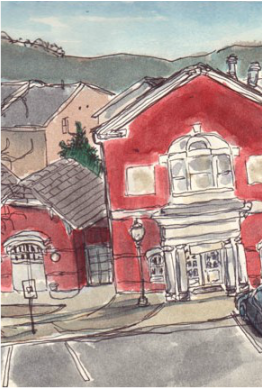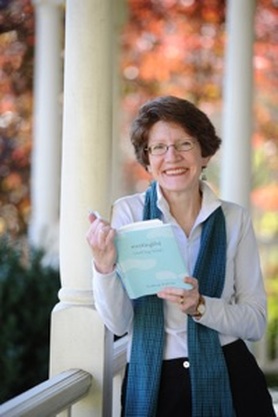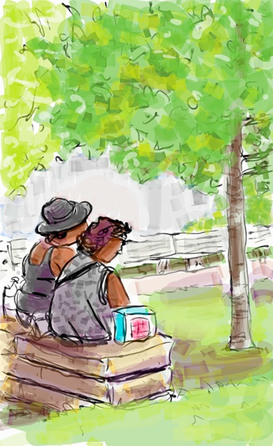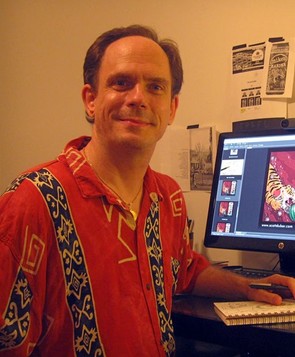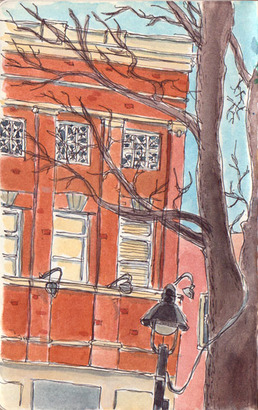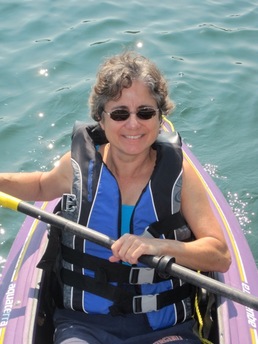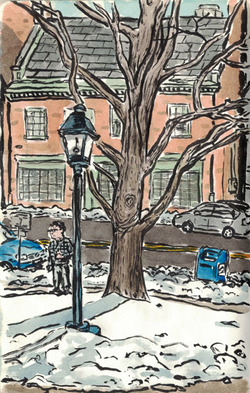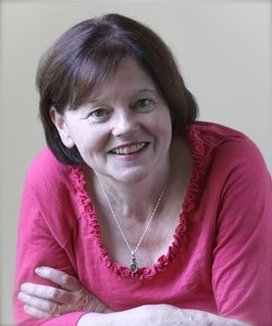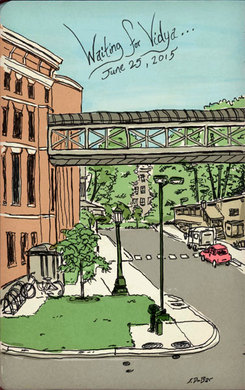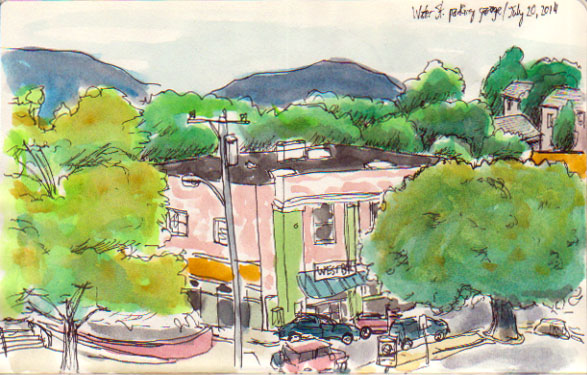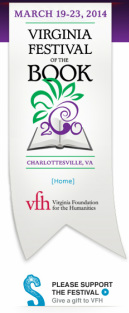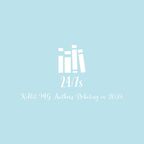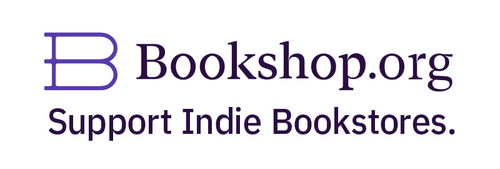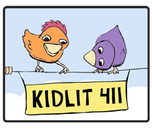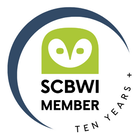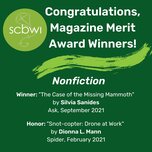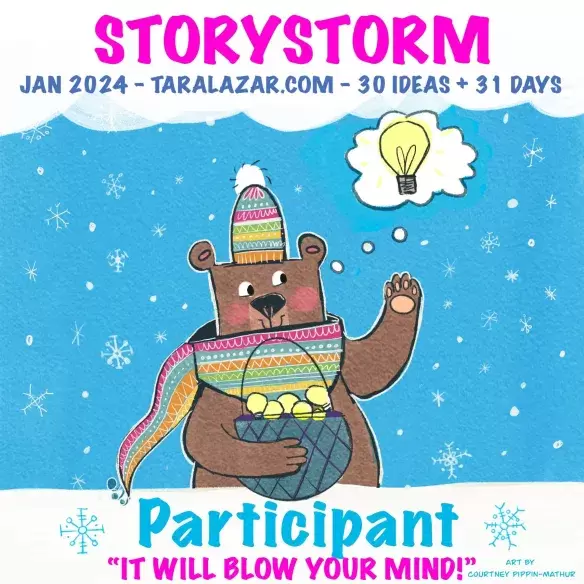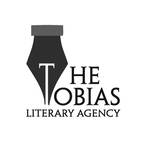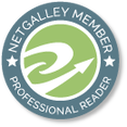I teach high school and college students and work with both beginners and advanced writers depending on the class. So it's a toss-up--there's nothing like working with a student on their very first story, helping them find the courage to put pen to page, to find their voice and delve into their imagination and explore, to experiment. But I also find great joy in working with students who already have a great deal of experience. Editing, at the sentence level, is a wonderful process as well, and helping a student prepare a piece for their MFA application or for submission to a literary journal is incredibly rewarding.
Tell us about your connection to Judy Blume, who praised your YA novel, Fingerprints of You.
Judy discovered my work in a contest shortly after I received my MFA. She read a short story of mine, which she found in the slush-pile for the Key West Literary Seminar fiction award, and something just clicked. In the end, I won the fiction prize and was awarded a trip to FL for the conference, where she and I met. She was kind and generous and honest with me about my work, which was invaluable. At the time, I was writing a novel, but I was struggling to make that leap into the publishing world. I had moved around a great deal after college and didn't have a community of writers to lean on, so her support and eventual friendship made a world of difference. She has become one of my greatest champions, and I'm so very grateful.
What do you love about Charlottesville's writing community?
The truth is that, in the end, we do the work alone. Alone at the desk, at the computer, in our notebooks and in our heads. But having a community to lean on makes all the difference when you're wading through struggles in your work. One of the things I love most about the writing community here is the diversity of work being produced. There are writers of all kinds--all genres and styles and forms, and I find that to be very inspiring and motivating. Meeting authors who are writing work unlike my own encourages me to branch out and try new things on the page, to take risks.
What do you love about the Virginia Festival of the Book?
How much time do we have?!? I've been working with the festival as a volunteer and a panelist since I moved to town in 2008, and each year it never ceases to amazing me how many prestigious authors there are, how many dynamic events, how many thought-provoking panels... and it's ninety-nine percent free! It's such an important piece of our community.
Tell us about your novel that is coming out in May.
My new novel, Invisible Fault Lines, is a young adult novel whose storyline hinges on a missing person mystery in San Francisco in 2006. The central character, Callie Pace, is determined to discover what happened to her father after he disappeared from work, but she has no clues and no leads. Because it takes place during the hundredth anniversary of the San Francisco Earthquake of 1906, it also weaves in a historical fiction element. So the book is part contemporary fiction, part historical, and part mystery. There's also a dash of fantasy depending on how you read the ending. It's about grief and faith and the different ways we cope with loss. It's also about San Francisco, family bonds, presidential quotes and punk music. This book was a leap of faith for me, and I took a lot of risks when writing it, so I'm really excited send it out into the world.
Kristen-Paige Madonia is the author of the young adult novels Invisible Fault Lines (Simon & Schuster Books for Young Readers, May 2016) and Fingerprints of You (Simon & Schuster BFYR, 2012). Hailed by Judy Blume as “A remarkable young novelist,” Madonia was the 2012 D. H. Lawrence Fellow, and her short fiction has appeared in such publications as the Greensboro Review, Five Chapters, New Orleans Review, and American Fiction: Best Previously Unpublished Short Stories by Emerging Writers. She has received awards and fellowships from the Sewanee Writers’ Conference, the Hambidge Center, the Vermont Studio Center, Juniper Summer Writing Institute, Virginia Center for Creative Arts, Hedgebrook Writers’ Retreat, Millay Colony for the Arts, and the Studios of Key West. She was the 2010 recipient of the Tennessee Williams/New Orleans Literary Festival award and was granted the Marianne Russo Fellowship to attend the 2008 Key West Literary Seminar. She holds an MFA from California State University, Long Beach and currently lives in Charlottesville, Virginia where she teaches creative writing at the University of Virginia, James Madison University and WriterHouse. She is also a Faculty Mentor with the University of Nebraska’s low-residency MFA in Writing Program. Visit her at kristenpaigemadonia.com or @KPMadonia on Twitter.
This year, I have one child in elementary school, one in middle school and one in high school.
Because of them, I have been honored to log many volunteer hours in schools. I have served on PTO boards, chaired talent shows, planned class parties, shelved library books, sharpened box after box of pencils, gone on dozens of field trips, helped kids learn to read, helped kids write fiction and poetry, chaperoned dances and carnivals.
All of this has afforded me the opportunity to be an observer of universal childhood milestones and rituals--to remind my adult-self of things my child-self had experienced and forgotten. I hope this deepens my characters’ emotions and dialogue in a way that rings true with readers.
Do you find that the stories you create contain a recurring theme? If so, explain.
My main characters tend to face enormous problems for their age and be underdogs of sorts.
In Gatherin’ Up the Mountain, Mattie and her family face eviction from their mountain home during the Great Depression when the Blue Ridge Parkway was being built in Shenandoah National Park. Josias grapples with Haitian poverty, illiteracy, and land erosion in Josias, Hold the Book. And Anett works with the Danish Resistance to hide Jews and ensure their safe passage to the Gilleleje harbor for escape to neutral Sweden during World War II in The Whispering Town.
I never expected Mattie, Josias and Anett to solve world problems. It’s too big for them. For anyone. But I did require them to be brave and kind problem-solvers in the immediate world around them, with their families, friends and neighbors. Their actions leave their readers with pin pricks of hope.
How has participating in and being in attendance at the Virginia Festival of the Book helped you grow as a writer?
I have been presenting panels at the Virginia Festival of the Book for 15 plus years. One of my critique groups, The Moseley Writers, has been offering an encore panel called “Off to a Good Start: How to hook an editor on the first page.” Participants email the first 100 words of a fiction piece to us before the panel. When we receive the entries, we read them a couple of times and make notes independently. During the panel, we read aloud as many of the entries as we can, anonymously, then discuss what’s working and what can be improved in light of: tone, pacing, setting, characterization and voice.
We’ve gotten positive feedback from not only authors who put their work forward but also audience members who didn’t submit work. It’s a learning experience for everyone. I’m happy to participate in this panel because of the children’s authors who were helpful and kind to me when I was making the switch from newspaper and magazine work to children’s fiction. For me, it’s a way of paying it forward.
I also attend panels at the festival to be inspired by other writers, in particular Lois Lowry, Katherine Paterson and Kate DiCamillo. When I started writing for children it was short magazine fiction and picture books. I started playing around with some middle grade novel ideas but often felt overwhelmed by the comparative length of the manuscripts. When Kate DiCamillo spoke at a recent festival, she talked about her writing day. Her goal is to write two pages every weekday, taking the weekends off. I had never considered a pages per day goal. I thought, “I can do that.” It made all the difference to me organizing manuscripts in a way that gave me daily success in completing goals. It changed my entire outlook.
What do you enjoy about Charlottesville's writing community?
The children’s writing community in Charlottesville is filled with kind, generous and supportive people. They are quick to form fast friendships with other children’s writers and promote each others’ work over social media and in-person at book launches, lectures and panels. They are warm, have wonderful senses of humor, and most love chocolate. The chocolate is really important for all sorts of ups and downs.
What writing project are you working on?
I recently finished revisions on a middle grade novel about a rescue horse. Over the next couple of months, I plan to work on some picture book ideas that have been put on hold while finishing said novel.
Jennifer Elvgren is a former print journalist whose picture book, The Whispering Town (Kar-Ben Publishing, 2014), received the Andersen Prize, been named to the ALA Children’s Notable Book List, is a Sydney Taylor Honor Book, and a Jane Addams Honor Book. She is also the author of Josias, Hold the Book (Boyds Mills Press, 2006) a Bank Street College Best Books selection and the recipient of the Américas Award for Children’s and Young Adult Literature. Her additional children’s fiction has appeared in Ladybug, Spider and Highlights for Children. She can be found online at jenniferelvgren.com.
This will take some explaining! I give credit to my mom, Ibuki Hibi Lee. She published a book about my grandma entitled Peaceful Painter Hisako Hibi: Memoirs of an Issei Woman Artist (Heyday Books, 2004). The book contains my grandma's memoirs and some of her paintings, including several that she created while incarcerated during the Japanese American internment.
My mom's book inspired me to start outlining a picture book biography about my grandma using her artwork as illustrations. I had recently heard about Lee & Low's New Voices contest and began working toward the goal of submission. Meanwhile, Children's Book Press, a longstanding publisher of multicultural/bilingual children's books, approached my mom. They wanted her to write a picture book set in a Japanese American internment camp and to incorporate a camp art school. My mom was five years old at the start of the internment; she attended the camp art school where my grandma and grandpa, who were professional artists, taught. However, my mom had just been through the long process of writing and publishing her book (during which time she battled cancer and won). She was ready to get back to living her life!
That's when I happily stepped in. Lucky for me, Children's Book Press was open to giving me a shot. I stopped outlining the picture book biography about my grandma and started writing a historical-fiction picture book set in a Japanese American internment camp. Children's Book Press really liked the first draft, although it took a few rounds before I was offered a contract.
So, that's the story! An amazing opportunity landed in my lap and I accepted it with much gratitude.
Well, that's almost the whole story. Sadly, Children's Book Press closed its doors during the recession. Fortunately, it eventually became an imprint of Lee & Low, a publisher with a similar vision. It's kind of wild that my book, although not the story I had originally intended to submit to Lee & Low, ended up there several years later! I am proud to call Lee & Low its new home.
What was your emotional reaction to having your book illustrated by Felicia Hoshino?
Oh, Felicia’s illustrations blew me away. She managed, at once, to capture the harsh conditions of the Japanese American internment camp AND the gentle feeling of the story. Also, she surprised and moved me by incorporating some of my grandma’s art concepts into the illustrations. My publisher played the perfect matchmaker in choosing Felicia!
What have you enjoyed about attending and participating in the Virginia Festival of the Book?
Every year I ask my husband, who often travels for work, to avoid travel during Festival week so he may deal with the house and kids! I attend as many sessions as I can manage. This is a town that already loves books, so the Festival only ramps up the buzz in the air and I feed off of that energy. I learn; meet other writers, authors, and professionals in the field; and gain inspiration that carries me forward for months. As far as my participation goes, presenting my book at the Festival was one of the most positive experiences I've had; there was such a genuine interest from the audience to learn.
What do you love about Charlottesville's writing community?
Especially in light of its small size, Charlottesville is home to lots of writers. It has a vibrant, supportive writing (and reading) community! I discovered WriterHouse a couple of years ago and have learned a good deal about the craft and business through classes and workshops. I met my fellow critique group members in a WriterHouse workshop; they are my go-to for manuscript feedback, support, and lots of laughs.
What projects are you working on now?
I'm working on several picture book manuscripts, ranging from a biography of an Asian American politician to humorous stories about growing up. I'm also prepping to launch my author website and blog.
Amy Lee-Tai is a mom to two girls and two cats, and is a former reading specialist to elementary and middle school students. She authored A Place Where Sunflowers Grow, illustrated by Felicia Hoshino (Children’s Book Press, an imprint of Lee & Low, 2006). It is a historical fiction picture book about the Japanese American internment and won the Jane Addams Children's Book Award for Younger Children in 2007. When not reading and writing, Amy loves to take walks, eat dark chocolate, drink strong coffee, and connect with family and friends (although she hasn't yet tried doing all those things at once).
